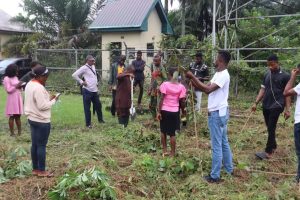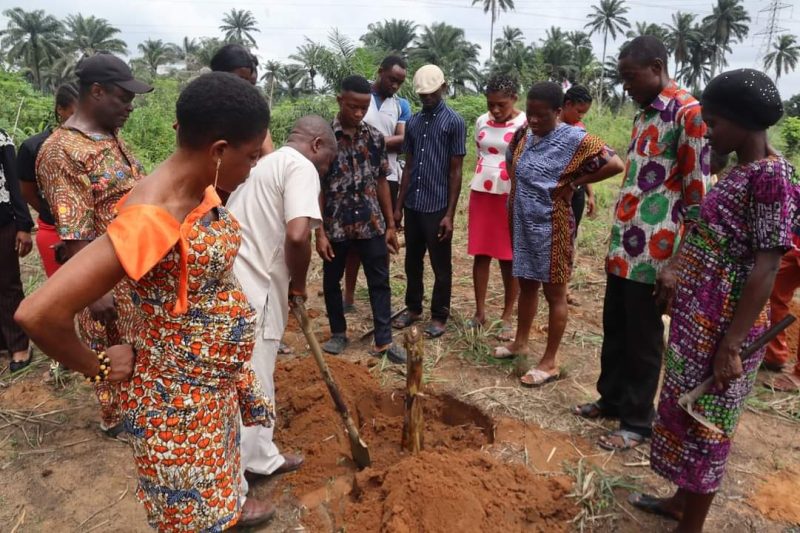
In a concerted effort to promote sustainable agriculture and equip the next generation of farmers, the Clement Isong Foundation (CIF), in collaboration with ActionAid Nigeria and the Akwa Ibom State Agricultural Development Programme (AKADEP), hosted a comprehensive three-day training program for 94 young farmers across nine communities in Akwa Ibom State.
Spanning nine days, from Monday, May 13th to Wednesday, May 23rd, 2024, the training sessions were held in the Local Government Areas of Etinan, Ikot Ekpene, and Ibeno. The focus was on agroecology and agripreneurship, empowering participants with practical knowledge and skills to implement sustainable agricultural practices on their farmlands.
The Project Manager at Clement Isong Foundation, Mrs. Caroline Gordian said the agroecology training equipped young farmers with knowledge of organic farming techniques like natural pesticides and composting.
The Project Manager said the enthusiasm of the youths to become “agripreneurs” thus driving sustainable agriculture in Akwa Ibom State is inspiring hence the training.
She said by reducing reliance on harmful chemicals, young farmers can protect the environment while improving their yields and incomes.
The Executive Director of the Clement Isong Foundation, Mr. Elkanah Oluyori, said that climate change poses a significant threat to agriculture, disrupting traditional growing seasons and diminishing crop yields.
He explained that through the training, CIF aims to equip young farmers with the tools and techniques to build resilient and environmentally friendly farming systems, ensuring long-term food security and economic prosperity for our communities.
The training programme which was facilitated by Mr. Owoidighe Inyang of AKADEP, employed a participatory and interactive approach to cover various aspects of sustainable agriculture and the reduction of agrochemicals.
Participants gained valuable insights into soil conservation, sustainable water management, multiple cropping, insect trapping, agroforestry practices, and sustainable livestock management, including bee farming, snail farming, and mushroom cultivation.
Practical sessions were a highlight of the training, showcasing innovative techniques for producing organic pesticides using natural materials like neem leaves and seeds, composting organic waste for manure, and creating organic herbicides from salt, water, and soap.
Participants also had the opportunity to engage in demo farming sessions, where they planted crops such as cocoa, plantain, and cocoyam, reinforcing their newfound knowledge through hands-on experience.
Participants were provided with improved seedlings, including rice pudding, cucumber, okra, and maize, to support the practical implementation of the learned principles on their farms.
The training encouraged knowledge sharing within communities, fostering a multiplier effect and ensuring the widespread adoption of agroecological practices.
Testimonials from participants highlighted the transformative potential of the training.
According to MidigeAbasi Johnson from Etinan, “I never knew that neem leaves, which are in my compound, could be used to minimize pests on my farmland; this will surely reduce my cost of buying inorganic pesticides”.
Amida Gabriel, a participant from Ikot Ekpene, shared her enthusiasm, stating, “I am so thrilled at the level of knowledge I have gained these three days. I have learned a lot, and what stands out for me is the production of organic herbicides. I will not have to spend so much on weeding.”
Lily Okon from Ibeno emphasized the importance of sharing the acquired knowledge, saying, “This training cannot end with me; it is an eye-opener. I will sensitize as many people as I can in my community.”
The Executive Director of the Clement Isong Foundation earlier said that the
Foundation is poised in its commitment to supporting farmers and promoting sustainable agriculture in Akwa Ibom State.
He said through collaborative efforts and knowledge exchange, the Foundation aims to build a resilient, inclusive, and prosperous agricultural economy that thrives amidst the challenges of a changing climate without causing harm to the environment.

